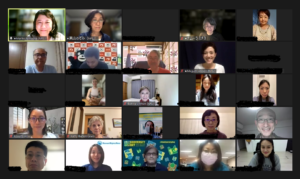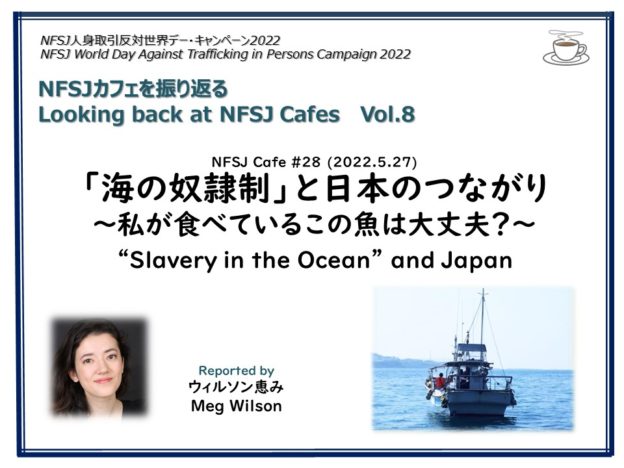(NFSJ Café #28, May 27, 2022 online)
Guest lecturer:
Ms. Anju Kozono (Business and human rights coordinator at Human Rights Now)
At the 28th NFSJ Café, we had Ms.Anju Kozono from Human Rights Now come and discuss with us about the realities of slavery in the fishing industry and Japan’s stance in relation to the Illegal, Unregulated, and Unreported (IUU) fishing industry.
We held this event online, prior to Japan’s first showing of Ghost Fleet (2018), which is a documentary that follows Thai activists in their work to bring home those who are stuck at sea. Many workers are recruited from rural parts of their country, only to be placed under harsh working conditions as fishermen. Ms. Kozono explained how Japan may be contributing to this industry, largely unknowingly, by purchasing and consuming fish from the IUU fishing industry.
Japan is a large consumer of fish, both domestically and internationally, as traditionally people would eat fish at least once a day. However, the dark industry behind some of the products remains highly unknown. Ms. Kozono explained that Japan is the 3rd largest importer of seafood, and unfortunately, 24~36% of those fish are purchased from the IUU fishing industry. Most of the participants were very surprised by this statistic, and even more alarmed by the fact that the fish are being sold in the supermarkets in as processed fish and other products.
Certain countries and organizations have put laws and restrictions in place to help ensure legal practices within their regions or contributing countries, such as the European Union (EU) and the Food and Agricultural Organization (FAO) of the United Nations (UN). Japan is a part of an agreement made by the FAO, the Port State Major Agreement (PSMA), and uses the Marine Stewardship Council (MSC) and the Aquaculture Stewardship Council (ASC) certifications as well. These laws help protect the human rights of those stuck as laborers, often harassed and forced to work for little to no pay, and ensure that more businesses and individuals are more aware of where their fish come from.
Ms. Kozono gave us several ideas for combating slavery in the fishing industry from Japan, which include getting educated on the situation in Japan, raising awareness about this issue, and finding and supporting organizations that fight against illegal fishing and slavery at sea.
(Meg Wilson)
-For more information on IUU fishing (Report by Human Rights Now)
https://hrn.or.jp/eng/wp-content/uploads/2022/06/HRN-Report-on-the-Results-of-a-Questionnaire-Survey-of-Japanese-Fishing-Companies-Dec.-2021.pdf
-Ghost Fleet Official Trailer
https://www.youtube.com/watch?v=5cSUYlY_dhg


